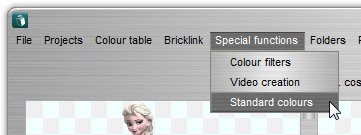 Legoaizer -
Help Legoaizer -
Help |
 Legoaizer -
Help
Legoaizer -
Help
Standard colours
This
feature is
a bit of a strange one in the rich list of functions and features of Legoaizer. One
would expect to build a brick mosaic from real bricks, Ministeck® parts or Beads, but
this feature requires the use of real world paint. Since
each brick is made of plastic
it can also be repainted, e.g. by airbrush or from spraypaint. The paint
colours that are available are almost always part of a Standard Colour system,
e.g. RAL in Europe, FS 595 in USA, and others, like Australian Standard AS2700
and Britisch Standard Colours. To make a brick mosaic can now be made with a
much wider and more fitting colour palette than the 50 practical or so colours of bricks
and the 24 of Ministeck®. It
requires though a bit of DIY to actually prepare the bricks, spraypaint, wait to
dry and then build the mosaic. Finally, you can create your own Standard
Colour database. The details of how to create a valid database is found in the
'Additional help' on Dataset structures
. Activate the Standard
Colour The
Standard colours
must
first be active. This is done by selecting the pressing the 'Standard colours' option
from the 'Special functions' in
the main menu bar. This will then open the Colour matching options window,
press on the gray text (in the empty area on top) 'Click here to activate the Standard colours'. You are then asked to agree, because the current
brick-colour dataset will be discarded and the new Standard Colour dataset will become active.
When you
right-click in the graphical colours reprentations area (the 'dots') you
can conveniently convert the standard colours data set into a Legoaizer
brick dataset. There are four possible conversions. All sets except
Ministeck® are converted to a one-brick dataset (3005
(1x1) for bricks, 3437 (2x2) for duplo,
and 1x1
for Beads). The Ministeck® sets is
completely converted to its 5-piece brick set. The sets are only saved, and are
not automatically opened in the application. The sets are saved in the default
location (see here
for details).
As
mentioned above, the only way to get the e.g. Bricklink data tables for real Ministeck® and bricks back again is by
opening these via the main menu 'Colour table'
> 'Open
table' and then select your choice of colour table. Of course you can
also quit the application and restart. That will load the last used table again.
The Standard Colour set is not remembered when exiting the application.
Basically that is all there is to do. After the Standard Colour is activated,
you can create mosaics like with any normal brick-colour (and Bricklink) dataset.
Brick selections of a Standard Colour set
Unlike a
real brick and Ministeck® dataset (brick-colour table),
the Standard Colours have no associated bricks. Therefore all the
colours are connected to a predefined series of bricks, with no initial restrictions on
availability. The cost of each brick is however calculated from clever use
of the Bricklink dataset, where the cheapest prices for these bricks are used
as guidelines. This way a pretty realistic cost estimation is still possible, and
as a consequence the cost of a brick is therefore the same for every colour. These are the bricks that are
associated with the Standard Colours: 1x1, 1x2, 1x3, 1x4, 1x6, 1x8, 2x2, 2x3, 2x4,
2x6 and
2x8 studs. You can also edit the availability like any normal brick-colour table, by unchecking a
brick-colour combination in the brick table editor, and then save
the result for a next project. Colour content of the Standard Colour
set
Below you see three examples of a colour
range from three standards. Each dot is a colour point. There are no checkboxes for each
colour in this overview, so you cannot pre-select colours from this list. That is only possible
with the list in the main interface (like you do with a normal brick-colour table).
Picture: from left to
right Australian Standard AS2700, RAL Classic and Federal Standard
595. Change a Standard Colour set
To change
the colour set you select one from the drop-down list, and then press the 'Apply' button. It will immediately replace all the colours
in this windows and the list in the main interface.


